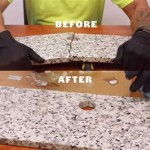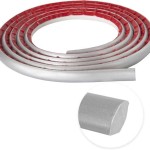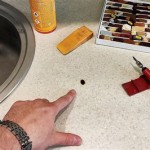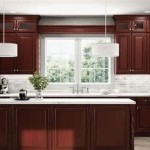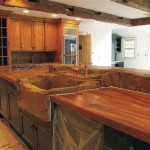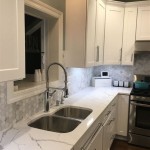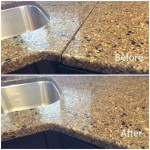Slate Countertops: A Comprehensive Look at the Pros and Cons
Slate countertops have emerged as a distinctive and increasingly popular choice for homeowners seeking a natural, durable, and aesthetically pleasing surface. Formed over millions of years from compressed sedimentary rock, slate offers a unique textural quality and a range of dark, earthy tones. While its inherent characteristics present several advantages, it’s crucial to consider the potential drawbacks before making a decision about incorporating slate into kitchen or bathroom designs. This article will delve into the pros and cons of slate countertops, providing a comprehensive overview to assist in informed decision-making.
Aesthetic Appeal and Unique Characteristics
One of the primary draws of slate countertops is their inherent aesthetic appeal. The natural stone presents a subtly textured surface, often exhibiting variations in color and pattern that contribute to its distinctive character. Unlike granite or marble, slate typically displays a more muted and understated elegance, often appearing in shades of gray, black, charcoal, and occasionally with hints of green, purple, or brown. These variations create visual interest without being overly ostentatious, lending themselves well to a variety of design styles, from traditional to contemporary.
The honed finish commonly applied to slate countertops accentuates the stone’s natural texture and minimizes light reflection, resulting in a soft, matte appearance. This finish also tends to be more forgiving of minor scratches and imperfections, which can become less noticeable over time. The natural cleft of the slate, resulting from the splitting process, contributes to its unique texture, adding to its overall visual charm.
Furthermore, slate's inherent coolness makes it an excellent choice for baking and other culinary activities that require a cold surface. The stone’s thermal properties help to maintain a stable temperature, preventing dough from becoming too warm and sticky during preparation. This functionality, combined with its attractive appearance, positions slate as a practical and aesthetically pleasing choice for avid bakers and home chefs.
Durability and Maintenance Considerations
Slate is known for its inherent durability and resistance to staining and heat. Its dense, non-porous structure makes it less susceptible to absorbing liquids, reducing the risk of stains from common kitchen spills like coffee, wine, and oil. The stone’s high density also contributes to its resistance to bacteria and germs, making it a hygienic choice for food preparation areas.
However, while slate is generally durable, it is not impervious to damage. While difficult to stain, certain highly acidic substances, such as lemon juice or vinegar, can etch the surface if left in contact for an extended period. Etching refers to the dulling or discoloration of the stone's surface due to a chemical reaction. Proper sealing and prompt cleanup of spills are therefore crucial to maintaining the integrity of the countertop.
Furthermore, slate can be susceptible to chipping or scratching, particularly along the edges or corners. While minor scratches can often be buffed out, more significant chips may require professional repair. The softness of slate, compared to materials like granite or quartz, makes it more vulnerable to damage from heavy objects, sharp knives, or abrasive cleaners.
Maintenance of slate countertops typically involves regular cleaning with a pH-neutral cleaner and occasional resealing. The frequency of resealing depends on the specific type of slate, the level of use, and the type of sealant applied. A penetrating sealant is recommended to protect the stone from water absorption and staining. Proper cleaning and maintenance practices are essential to preserving the beauty and longevity of slate countertops.
Cost and Installation Complexities
The cost of slate countertops can vary depending on the quality of the stone, the complexity of the fabrication, and the installation requirements. Generally, slate falls in the mid-range of countertop materials, often priced competitively with granite and some quartz options. However, the overall cost can increase based on factors such as the size and shape of the countertop, the number of cutouts for sinks and appliances, and the complexity of the edge detailing.
Installation of slate countertops requires specialized skills and experience. The stone can be brittle and prone to cracking if not handled carefully. Precise measurements and accurate cutting are crucial to ensure a seamless and aesthetically pleasing installation. It is highly recommended to entrust the installation to a professional fabricator and installer with expertise in working with natural stone. Improper installation can lead to structural problems, such as uneven surfaces, loose seams, or water damage.
Seams in slate countertops can be more visible than those in other materials due to the stone's natural variations in color and texture. Careful selection of slabs and meticulous seaming techniques are essential to minimizing the appearance of seams. Professional installers can utilize techniques such as color matching and epoxy filling to create more seamless and less noticeable joints.
Furthermore, the weight of slate can pose challenges during installation, particularly for larger countertops. Adequate structural support is necessary to ensure that the countertop is properly supported and does not sag or crack over time. Reinforcement of the base cabinets may be required to accommodate the weight of the stone. Consideration of these installation complexities is crucial to ensure a successful and long-lasting installation.
Slate countertops present a compelling option for those seeking a natural stone surface with a unique aesthetic appeal and reasonable durability. However, prospective buyers must carefully weigh the advantages and disadvantages to make an informed decision that aligns with their lifestyle, budget, and design preferences. Regular maintenance and appropriate cleaning practices are crucial to preserve the integrity and appearance of slate countertops over time. Choosing a qualified installer with experience in working with natural stone will ensure a successful and long-lasting installation.

Slate Vs Soapstone Countertops Pros And Cons Of Each

The Benefits And Drawbacks Of Slate Countertops Denver Stone Plus

Slate Countertops Er S Guide Countertop Specialty

Where To Black Slate Countertops D And W Srq Llc

Are Slate Countertops Suitable For Use In The Kitchen And Elsewhere Home

Slate Countertops Er S Guide Countertop Specialty

Slate Tile Countertops Advantage And Disadvantage

Are Slate Countertops Suitable For Use In The Kitchen And Elsewhere Home

Slate Countertops Er S Guide Countertop Specialty

Slate Tile Countertops Advantage And Disadvantage
See Also

